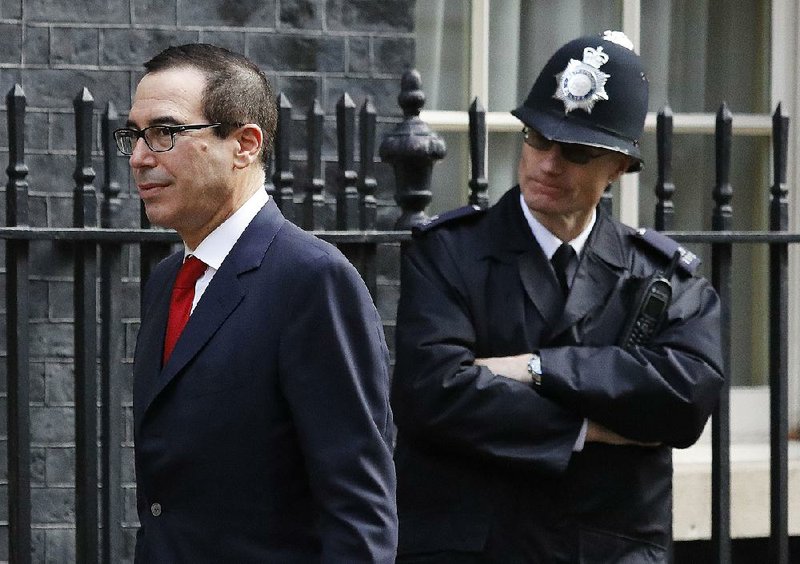FRANKFURT, Germany -- U.S. President Donald Trump has vowed to get tough on trade partners such as China, Mexico and Germany. Now his Treasury chief, Steven Mnuchin, will get his first opportunity to confront them all in one room.
The meeting of the most powerful economies' finance ministers in Germany this week is likely to be dominated by talk about whether to commit to free trade, as previous meetings have -- or implicitly accept that some countries may raise barriers, like tariffs, as Trump has promised.
The Group of 20 -- 19 countries worth most of the global economy, plus the EU -- is also scheduled to discuss a longstanding ban on manipulating currencies to gain economic advantage. Weakening a currency can help a country's exporters, but can also end up dumping its troubles with business costs and competitiveness on its trade partners.
The gathering today and Saturday in the southern German resort town of Baden-Baden will help set the tone for international commerce and finance and will give Mnuchin a chance to clarify the U.S. position.
[PRESIDENT TRUMP: Timeline, appointments, executive orders + guide to actions in first 100 days]
The focus will be on the final statement issued jointly by the finance ministers on Saturday.
Last year's gathering of the Group of 20 finance ministers in Chengdu, China, issued a statement opposing "all forms of protectionism." This time, such unequivocal language could be softened to refer to trade that is "open" and "fair," without the absolute opposition to import restrictions to benefit domestic workers.
Trump has repeatedly emphasized that the U.S. needs a tougher approach to trade that would put American workers and companies first. He has already pulled the U.S. out of the proposed Trans-Pacific Partnership agreement with Japan and other Pacific Rim countries and he has started the process to renegotiate the North American Free Trade Agreement with Mexico and Canada, both of whom are G-20 members.
Additionally, Britain is preparing to pull out of the European Union and its free-trade zone that permits cross-border business without import and export taxes, or tariffs, after voters chose to leave in a referendum last year.
"We are committed to open and fair trade," said a senior U.S. Treasury official this week, who briefed reporters only on condition of anonymity to discuss the U.S. position ahead of the talks. "That means a trading system that has a level playing field for our firms and our workers globally. We will be encouraging policies that lead to that level playing field."
The official would not comment on what language might be in the finance ministers' final statement this week.
He also did not want to discuss what changes, if any, the United States might be seeking to the G-20's statement on currency policy but said Mnuchin would press counterparts to live up to their commitments to refrain from manipulation. During the campaign, Trump said he planned to name China a currency manipulator right after he took office. But since taking office, he has not discussed the topic.
Federal Reserve Chairman Janet Yellen will join Mnuchin in representing the United States. Other prominent participants will be European Central Bank President Mario Draghi, Chinese Finance Minister Xiao Jie, and the host finance minister, Wolfgang Schaeuble of Germany.
On the eve of the gathering, Schaeuble made clear Germany would fight to keep the global economy open, saying that "protectionism and nationalism are never the right answers."
The G-20 is also scheduled to discuss ways to strengthen the global economy and create more jobs. Other issues include international financial regulation and efforts to crack down on tax avoidance and evasion.
The summit is taking place with the global economy in relatively good shape: the International Monetary Fund predicts growth of 3.4 percent this year and 3.6 percent next year, compared with 3.1 percent last year.
Yet the election results in Britain and the U.S. have underlined discontent with trade and globalization and a sense among many that the benefits of a globalized economy -- that is, with fewer barriers to trade and business -- do not reach enough people. Ahead of the summit, IMF head Christine Lagarde said that it was clear that highly educated workers benefit more from globalization and called for the G-20 to focus on "greater efforts to equip lower-skilled workers with the tools they need to seek and find better-paying jobs." Those could include targeted job training and education.
The G-20's members make up more than 80 percent of the world economy. The finance ministers' meeting will pave the way for a summit of national leaders in Hamburg, Germany, on July 7-8.
Business on 03/17/2017
